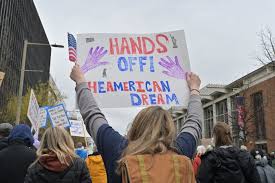Wide global protests against the policies of Trump and Musk under the slogan "Raise Your Hands".

The United States and the world witnessed an unprecedented wave of protests on Saturday, April 5, against the policies of U.S. President Donald Trump and the Department of Government Efficiency led by his ally Elon Musk. Tens of thousands of protesters took to the streets in coordinated demonstrations under the slogan "Raise Your Hands," in the largest protest movement since Trump took office in January.
Thousands of people demonstrated in several American cities, including Boston, Chicago, Los Angeles, New York, Washington D.C., Atlanta, Philadelphia, Colorado, New Hampshire, Arizona, Maine, and others.
These protests were in rejection of the policies implemented by the Trump administration in various areas, such as social and economic issues, especially after his recent decision to impose tariffs on imports from most countries around the world.
According to organizers, more than 1400 protest events were planned in all fifty U.S. states, where protesters gathered in front of Congress buildings, federal offices, and city squares, demanding an end to what they described as "billionaire dominance and corruption," halting cuts in funding for Social Security and Medicaid programs, and ending attacks on immigrants and transgender individuals.
The protests were not limited to the United States, but also spread to several international capitals, including London, Paris, Berlin, Frankfurt, Lisbon, Mexico, and Canada.
In London, around 200 people, mostly Americans, gathered holding signs that read "Raise Your Hands," expressing their rejection of Trump's policies on human rights and the economy.
In Germany, the cities of Berlin and Frankfurt saw hundreds of protesters carrying signs demanding the preservation of Social Security.
According to Reuters, Timothy Kautz, spokesman for the organization "Democrats Abroad," said: "We must stand in solidarity with the American protests and affirm that Trump's policies do not represent us."
Organizers emphasized that these protests are a response to what they described as "assaults on American rights and freedoms," indicating that the movement aims to pressure the administration to stop policies that undermine the interests of workers and marginalized groups.